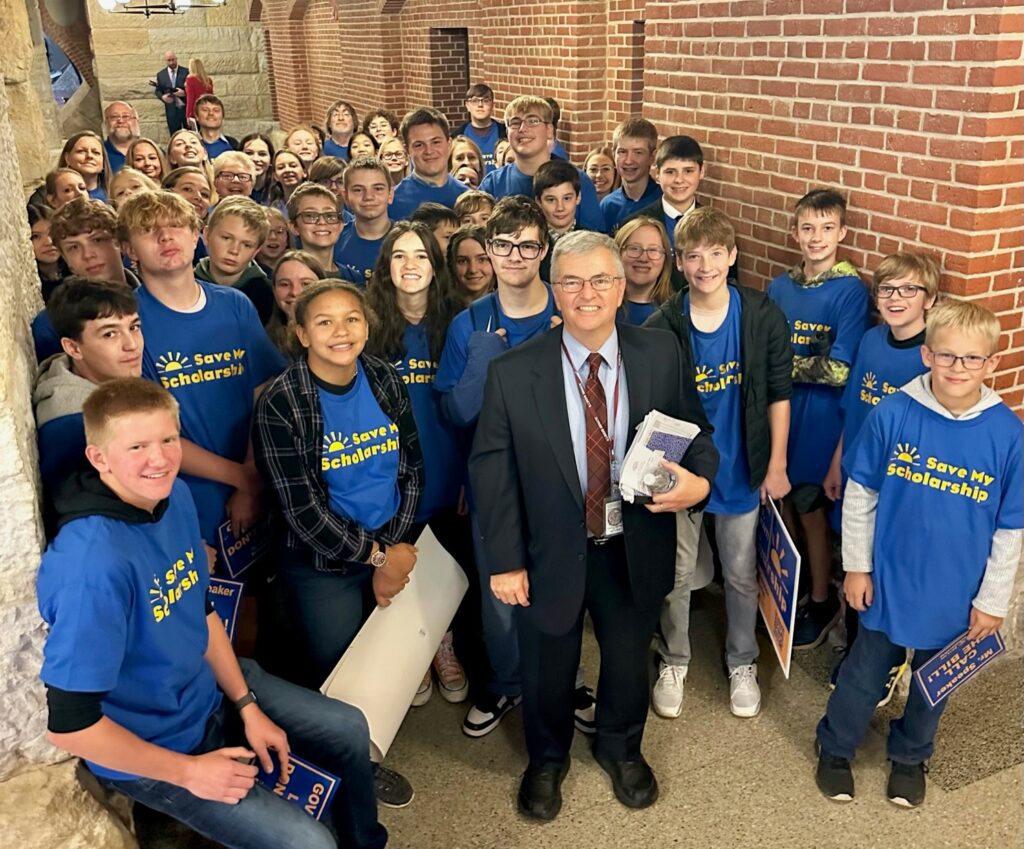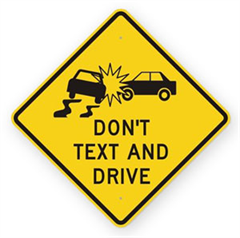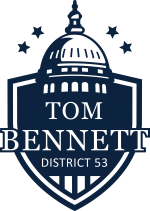Springfield, IL… As we prepare to bid 2023 a fond farewell and ring in the New Year, more than 300 new laws are set to take effect in Illinois on January 1, 2024. New laws for 2024 range from limiting 2nd Amendment Rights to more positive legislation supported by Senate Republicans that increases protections and support for children, veterans and first responders. A full list can be downloaded here.

Conflicting Priorities on Crime as the Year Ends
Among the issues that made headlines during the fall veto session is the Democrats’ refusal to extend
bipartisan legislation that passed in 2017 and is set to expire at the end of the year, that established higher minimum prison terms for people convicted for aggravated unlawful use of a weapon if they’d previously been convicted of certain crimes. The legislation also increased penalties for unlawful use of a weapon by a felon. Unfortunately, Democrat lawmakers blocked legislation that would have extended this law from being heard in the Illinois House of Representatives, which means it will expire at the end of the year. At the same time, Democrats prioritized passing legislation that created laws that allow non-citizens to work as police officers and felons to work at casinos, which take effect January 1.

New “Assault Weapon” Ban Requirements
While sales and purchases of certain firearms had already been made illegal by Illinois’ controversial “assault weapon” ban (AWB), Illinois residents who already owned guns covered by the ban are allowed to keep them if they file required paperwork before January 1, 2024.
The ban was the central component of the “Protect Illinois Communities Act,” which Gov. Pritzker signed into law on January 10, 2023. The law requires owners of now-banned weapons and/or accessories to file an affidavit with the Illinois State Police (ISP) stating that they owned the firearms and/or accessories before the ban came into effect on January 10, 2023.
ISP submitted rules for the process, including what firearms and accessories are banned, to the Legislature’s bicameral and bipartisan Joint Committee on Administrative Rules (JCAR). After pushback from lawmakers on the panel, ISP held a series of hearings this fall discussing the rules and soliciting questions and feedback. Much of the feedback involved confusion over exactly which firearms and accessories are included in the somewhat vaguely worded ban and rules.
Additional concerns involve firearms purchased during a window created by conflicting court rulings. Between April 28 and May 4, 2023, a federal injunction blocked the implementation of the ban, allowing Illinois residents to make purchases during that window of firearms that would have been illegal if the AWB were in effect. According to the ISP rules, those firearms will become illegal on January 1, 2024.
For more information on what firearms and accessories are included, ISP created a document which can be found at: https://isp.illinois.gov/StaticFiles/docs/Home/AssaultWeapons/PICA%20Emergency%20Rule%20Register.pdf
For further information, including setting up an online account to file an affidavit, visit: https://isp.illinois.gov/Home/AssaultWeapons
Meanwhile, several court cases challenging the constitutionality of the ban are ongoing, including two cases docketed with the United States Supreme Court.

Human Trafficking Victims Get Opportunity to Move Past Trauma
Victims of human trafficking will have more tools to overcome their trauma and pursue a better life under a new law sponsored by Senator Erica Harriss. The new law creates a pathway for victims, who are often forced to participate in unlawful activity by their traffickers, to expunge their criminal records.
House Bill 2418/P.A. 103-0035 allows victims of human trafficking to petition for vacation, expungement or immediate sealing of their sentence. It also allows the victim making the petition to attend hearings remotely to avoid undue hardship or create a risk of harm. The law also allows the petition to be filed under seal if a public filing may expose the victim to future harm. These steps help ensure a victim is able to avoid future victimization from their former abuser or abusers.

New Laws Protect Children in Legal Proceedings
A new law set to take effect on January 1 will help ensure that young victims of violent crimes won’t be re-traumatized when they seek justice through the criminal justice system. House Bill 2607/P.A. 103-0164, sponsored by Senator Chapin Rose, allows victims under the age of 13 to testify remotely in most cases.
The law was inspired by constituents of Sen. Rose who were forced to take legal action to prevent their child from being required to testify against their abuser in court, rather than via closed-circuit TV. This new law will spare families from having to take similar action to protect their children. Additionally, a new law sponsored by Senator Dale Fowler, allows for the admissibility of certified hospital or public or private agency records in adjudicatory hearings on abused, neglected, or dependent minors. Often in these cases, medical records are needed in court proceedings to prove abuse and neglect. House Bill 1434/ P.A. 103-0124 reduces burdensome restrictions and ensures the records are available, while still protecting their privacy.

New Tools in the Battle Against the Opioid Crisis
The Illinois Department of Public Health is reporting record-high opioid deaths in our state in 2022. To help combat this deadly crisis, Senate Republicans introduced and supported several new laws taking effect on January 1 to provide new tools to help save lives in the battle against this growing public health crisis.
Deaths resulting from drugs laced with fentanyl are becoming more common place, but a new law sponsored by Senator Sally Turner will expand the availability of test strips capable of detecting even trace amounts of fentanyl that substances may be laced with. House Bill 3203/P.A. 103-0336, will allow test strips to be sold over the counter and enable county health departments to provide them for free.
Schools will also be required to maintain a supply of an opioid antagonist, like Narcan under House Bill 3428/P.A. 103-0348 and public schools will be required to provide instruction to high schoolers on the dangers of fentanyl under House Bill 3924/P.A. 103-0365.

Greater Protections for Reporting Elder Abuse
More people will be able to report suspicions abuse that may have contributed to a senior citizen’s death under a new law taking effect January 1. House Bill 2858/P.A. 103-0329, sponsored by Senator Jil Tracy, states that any person may report information about the suspicious death of an eligible adult to an agency designated to receive such reports or to the Illinois Department on Aging. The new law will allow people who interact with the state’s senior citizens on a regular basis, and might have important information about possible abusive behavior, to come forward without fear of consequences from their employer.

New Laws Support, Protect First Responders
Several new laws that aim to support and protect first responders take effect in 2024. Senate Bill 1543/P.A. 103-0382, co-sponsored by Senator Seth Lewis, creates the position of Statewide PTSD Mental Health Coordinator. The Coordinator is tasked with implementing mental health support and education programs for law enforcement.
Whenever any full-time firefighter or paramedic contracts COVID-19 in the line of duty, causing them to be unable to perform their duties during a disaster declaration by the Governor, the employee will continue to be paid by their local government, other than Chicago, under Senate Bill 214/P.A. 103-0063, which was unanimously supported by the Senate Republican Caucus.
To further support first responders, municipalities will be required to provide the same medical insurance options to police, firefighters and corrections officers who experience a catastrophic injury on the job and can no longer work as provided to active workers under House Bill 3249/P.A. 103-0340, co-sponsored by Senators Donald DeWitte and Andrew Chesney. Additionally, Senate Bill 1963/P.A. 103-0009 creates a $500 tax credit for volunteer emergency workers.

Invest in Kids Set to Expire as Clock Strikes Midnight
Since the inception of the Invest in Kids program in 2017, more than $330 million in private donations have been made to a tax credit scholarship fund that has provided more than 40,000 scholarships to help low-income K-12 students in struggling schools optimize their chances for academic success by attending a school of their choice.
Now, because legislative Democrats refused to save the program, and Governor JB Pritzker failed to intervene, the program is set to expire as the new year begins. As the Senate Republican Caucus looks ahead to the New Year, this program and the students it serves will continue to be a priority.

School Safety, Staffing and Work-Based Learning Focus of New Education Laws for 2024
New laws that focus on school safety, incentives for teachers to work in hard-to-staff schools and work-based learning are all on deck for 2024.
Schools will be required to include in their emergency and crisis response plan a rapid entry strategy for law enforcement under House Bill 3559/P.A. 103-0194, co-sponsored by Senator Jason Plummer. Under HB 3680/P.A. 103-0197, if a student needs extra accommodation during emergencies, including natural disasters or an active shooter situation, then that accommodation will be considered during the development of that student’s individualized education program (IEP). Hard-to-staff schools will get a boost in the new year thanks to HB 3801/P.A. 103-0207, which provides $4,000 retention bonuses to National Board-Certified Teachers for two consecutive years.
Students seeking to enrich themselves with work-based learning experiences, including scheduled events of the FFA and 4-H programs, will be considered “in attendance” under House Bill 3814/P.A. 103-0560.

New Elections Laws for 2024
A number of changes to Illinois’ election law are coming just in time for the 2024 election cycle under Senate Bill 2123/P.A. 103-0467. Changes include:
A number of changes to Illinois’ election law are coming just in time for the 2024 election cycle under Senate Bill 2123/P.A. 103-0467. Changes include:
- Sponsoring entities of political committees: Removes requirement for a sponsoring entity to be listed on a political committee’s statement of organization forms submitted to the State Board of Elections (SBE).
- Voter pre-registration for 16-year-olds: Allows 16-year-olds to pre-register to vote. Voter registration application must be held in abeyance by SBE until they are old enough to vote; then it is sent to the proper election authority.
- Ballot information updates to the statewide voter registration list: For the purpose of adding and updating information maintained on the statewide voter registration list, requires election authorities to transmit, within one day of receipt, certain Vote by Mail (VBM) and early ballot information to SBE. Election authorities must also transmit information on rejected VBM ballots within one day after rejection. If the ballot is cured, it must be removed from the list. Requires SBE to maintain this information on its website and make it accessible to State and local political committees. Requires this information to be updated every 24 hours and the entire statewide voter registration list be updated every month.
- Vote Centers: Requires curbside voting to be available for a least one vote center per jurisdiction. Requires jurisdictions with a population of more than 500,000 to have at least two vote centers. Extends sunset on section of code mandating vote centers from July 1, 2023, to July 1, 2029.
- Task Forces: Creates the Ranked-Choice and Voting Systems Task Force to “review voting systems and the methods of voting, including ranked-choice voting, that could be authorized by law.” Creates the Security of Remote Vote by Mail Task Force to study issues relating to a fully electronic VBM process.
- Election Day State Holiday: Makes November 5, 2024, a state holiday known as the 2024 General Election Day. Adds that schools closed for the holiday must be made available to election authorities to serve as polling places.

Healthcare Changes for 2024
From background checks for healthcare workers to mandated coverage for certain cancer screenings and treatments, a number of changes are coming to Illinois healthcare in 2024.
Under House Bill 2102/P.A. 103-0428, co-sponsored by Senate Republican Leader John Curran, background checks for healthcare workers are expanded to all 50 states. It also sets out other provisions for more thorough vetting of the backgrounds of healthcare workers including a check against State Police and FBI databases, including civil, criminal, and latent databases. Additionally, it requires the State Police to forward records to state departments and agencies, and fingerprints to the FBI for a national criminal history.
House Bill 302/P.A. 103-0455, a new law that will require insurance companies to cover home saliva cancer screening tests for at-risk individuals, will take effect on January 1 thanks to the efforts of sponsor Senator Seth Lewis.
Other changes in coverage include:
- SB 1913/P.A. 103-0243: Requires coverage for behavioral health services delivered via telehealth.
- SB 1282/P.A. 103-0084: Mandates insurers and managed care plans to provide coverage for preventive liver disease screenings for high-risk individuals between ages 35 and 64.
- HB 3809/P.A. 103-0458: Mandates coverage for therapy, diagnostic testing, and equipment necessary to increase quality of life for children who have any disease, syndrome, or disorder that includes low tone neuromuscular, neurological, or cognitive impairment.
- HB 2799/P.A. 103-0325: Requires insurers and managed care plans to provide coverage for medically necessary proton beam therapy for the treatment of cancer. Prohibits insurers and managed care plans from requiring a higher standard of clinical evidence for the coverage of proton beam therapy than applied for any other form of radiation therapy.

Help for Parents of Children with Special Needs
A new law aims to empower parents of children with special needs as they make important medical decisions. Under prior Illinois law, parents had access to medical records for children under the age of 12. However, they could be denied access to certain records and test results for children 12 -17 years of age, even if the records are from tests and/or procedures that required parental consent to be performed. Once the child turns 18, if they are declared a developmentally disabled adult, parents could once again get access. Senate Bill 188 closes the loophole for special needs children aged 12 – 17, allowing parents to access certain medical records.

Changes for Sportsmen in 2024
Hunters, fishermen and trappers will be able to obtain a three-year license under a new law. House Bill 3677/P.A. 103-0456, for residents aged 65 or older, the fee is one half of the fee charged for a three-year fishing/hunting license. For resident veterans of the United States Armed Forces after returning from service abroad or mobilization by the President of the United States, the fee is one-half of the fee charged for a three-year fishing license. Veterans must provide to the Department, per administrative rule, verification of their service. The Department shall establish what constitutes suitable verification of service for the purpose of issuing three-year fishing licenses to resident veterans at a reduced fee. Additionally, under House Bill 2317/P.A. 103-0528, for sport fishing devices or spearing devices, any resident of Illinois who is age 26 or older who has not purchased a resident fishing license in the past 10 years shall be eligible to receive a one-time annual resident fishing license for a fee of $5. Provides that any nonresident who has not purchased a nonresident fishing license in the past 10 years shall be eligible to receive a one-time annual sport fishing license for a fee of $10.

New Transportation Laws Streamline Work Sites, Outlaw Video Conferencing While Driving
The Illinois Dig Once Act, Senate Bill 1438/P.A. 103-0378, co-sponsored by Senator Terri Bryant will reduce the number of construction projects necessary along roadways by requiring state agencies to coordinate to minimize the number of road excavations necessary for the installation of broadband infrastructure and underground utilities.
In recent years, the way we communicate and do business has changed rapidly and the use of video conferencing has increased exponentially. House Bill 2431/P.A. 103-0310 will keep roads safe by prohibiting individuals from video conferencing while driving.

New Laws Support and Recognize Veterans and Military Families
According to the Illinois Department of Human Services, more than 700 Illinoisans were identified as homeless veterans in 2022. Two new laws set to take effect on January 1 seek to reduce homelessness among veterans and extend other assistance to military families.
Senate Bill 2005/P.A. 103-0247, sponsored by Senator Craig Wilcox, requires housing authorities to develop and implement policies granting housing preferences to veterans who are homeless. Similar benefits are already provided to other groups of Illinoisans, and Wilcox’s law would extend these to veterans. (Note: Some housing authorities were already doing this, so it ensures that this benefit is available to all Illinois veterans/standardizes the practice.)
State agencies must now also consider the military status of any homeless family member when determining the eligibility for state or federal benefits such as housing or rental assistance, job training and employment opportunities under Senate Bill 1376/P.A. 103-0086, sponsored by Senator Sally Turner.
Sponsored by Senator Sue Rezin, Senate Bill 1072/P.A. 103-0409 designates the Honor and Remember Flag as the symbol of the State’s concern for and commitment to honoring and remembering the lives of all members of the United States Armed Forces who have lost their lives while serving.
Owning a pet can lift a person’s mood, and help veterans feel less stressed and provide comfort to those with post-traumatic stress disorder. House Bill 2500/P.A. 103-0434, a law set to take effect.

